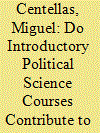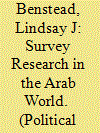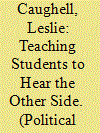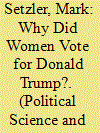|
|
|
Sort Order |
|
|
|
Items / Page
|
|
|
|
|
|
|
| Srl | Item |
| 1 |
ID:
160328


|
|
|
|
|
| Summary/Abstract |
Is the peer-review process at academic journals gendered? The answer to this question has important implications for the advancement of women in the political science profession. However, few studies have had access to data that can evaluate whether the peer-review process is gendered. We investigate this for papers submitted to the American Political Science Review across two editorial teams to identify trends over time. We evaluate overall differences across gender, but we also present more fine-grained data to evaluate gender differences across subfield, methodology, and submitting author’s institutional affiliation and academic rank. Furthermore, we show that prior service as a reviewer is associated with a higher acceptance rate for first-time submitters. We demonstrate that the review process is not gendered. Women’s share of submissions and acceptances has risen but remains lower than their presence in the discipline.
|
|
|
|
|
|
|
|
|
|
|
|
|
|
|
|
| 2 |
ID:
160330


|
|
|
|
|
| Summary/Abstract |
This article examines findings of a panel study of more than 1,000 students enrolled in introductory political science courses at a flagship public university. The survey assessed whether completing an introductory course had a positive effect on political efficacy, focusing on gender and race. We found that, at the aggregate level, completing an introductory political science course had little or no impact on self-reported measures of political efficacy. However, we found evidence of significant differences in external political efficacy between black and white students, even when controlling for factors such as background characteristics and course performance (i.e., grades). Our findings raise important questions about the “civic” function of the undergraduate political science curriculum, particularly regarding racial political inequalities.
|
|
|
|
|
|
|
|
|
|
|
|
|
|
|
|
| 3 |
ID:
160318


|
|
|
|
|
| Summary/Abstract |
The link between education and liberal attitudes is among the most consistent findings in public-opinion research, but the theoretical explanations for this relationship warrant additional attention. Previous work suggested that the relationship is due to education socializing students to the “official culture” of the United States. This study uses the World Values Survey and General Social Survey to examine Americans’ attitudes toward the justifiability of violence. I find that Americans with more education are less likely to say that interpersonal violence—against women, children, and other individuals—can be justifiable. However, they are more likely to say that state-sanctioned violence—war and police violence—can be justifiable. These patterns are consistent with a modified socialization model of education and social attitudes. I conclude that American education socializes people to establishment culture, identity, and interests, which differentiate between unacceptable interpersonal violence and ostensibly acceptable state-sanctioned violence.
|
|
|
|
|
|
|
|
|
|
|
|
|
|
|
|
| 4 |
ID:
160324


|
|
|
|
|
| Summary/Abstract |
The diversity of political spaces, availability of cheap labor, ease of access to powerful figures, and safety net of a foreign passport attract researchers to the developing world. However, environments of extreme state weakness and ongoing conflict permit research behavior that would be frowned on in the global north. We suggest that weak regulatory authority in conflict-affected states offers foreign academics opportunities that are not available when states have greater reach or capacity. Qualitative researchers may find requests to interview victims or perpetrators of wartime violence granted with ease. Experimenters can coerce under-resourced NGOs to pursue interventions at odds with their organizational mandates. We posit that conflict contexts can constitute permissive environments in which researchers can engage in conduct that would be considered deeply problematic at home. Because studying political violence can require firsthand research on aspects of political life not easily observed elsewhere, this article offers a set of guidelines to foster more ethical and responsible research practices.
|
|
|
|
|
|
|
|
|
|
|
|
|
|
|
|
| 5 |
ID:
160322


|
|
|
|
|
| Summary/Abstract |
The campaign leading to the 2016 US presidential election included a number of unconventional forms of campaign rhetoric. In earlier analyses, it was claimed that the Trump victory could be seen as a form of protest voting. This article analyzes the determinants of voters’ choices to investigate the validity of this claim. Based on a sample of the 2016 Cooperative Congressional Election Survey, our analyses suggest that a Trump vote cannot be explained by a lack of trust in politics or low levels of satisfaction with democracy, as would be assumed given the extant literature on protest voting. However, indicators of racist resentment and anti-immigrant sentiments proved to be important determinants of a Trump vote—even when controlling for more traditional vote-choice determinants. Despite ongoing discussion about the empirical validity of racist resentment and anti-immigrant sentiments, both concepts proved to be roughly equally powerful in explaining a Trump vote.
|
|
|
|
|
|
|
|
|
|
|
|
|
|
|
|
| 6 |
ID:
160331


|
|
|
|
|
| Summary/Abstract |
Many universities use student evaluations of teachers (SETs) as part of consideration for tenure, compensation, and other employment decisions. However, in doing so, they may be engaging in discriminatory practices against female academics. This study further explores the relationship between gender and SETs described by MacNell, Driscoll, and Hunt (2015) by using both content analysis in student-evaluation comments and quantitative analysis of students’ ordinal scoring of their instructors. The authors show that the language students use in evaluations regarding male professors is significantly different than language used in evaluating female professors. They also show that a male instructor administering an identical online course as a female instructor receives higher ordinal scores in teaching evaluations, even when questions are not instructor-specific. Findings suggest that the relationship between gender and teaching evaluations may indicate that the use of evaluations in employment decisions is discriminatory against women.
|
|
|
|
|
|
|
|
|
|
|
|
|
|
|
|
| 7 |
ID:
160329


|
|
|
|
|
| Summary/Abstract |
Core graduate-level seminars, in many ways, establish the “canon” literature for scholars entering a discipline. In the study of American Politics, the contents of this canon vary widely across departments and instructors, with important implications for the perspectives to which graduate students are exposed. At a basic level, the demographic characteristics of the authors whose work is assigned can have a major impact on the diversity (or lack of diversity) of viewpoints presented in these introductory courses. Using a unique dataset derived from a survey of core American Politics graduate seminars at highly-ranked universities, this project assesses the gender diversity of the authors whose research is currently taught—overall and within a comprehensive list of topics and subtopics. We also assess the “substantive representation” of women (and other underrepresented groups) within the American Politics canon by examining the frequency with which gender, racial, and other forms of identity politics are taught in these introductory courses.
|
|
|
|
|
|
|
|
|
|
|
|
|
|
|
|
| 8 |
ID:
160326


|
|
|
|
|
| Summary/Abstract |
Survey and laboratory experiments are increasingly common in political science. Investment in experimental data collection comes with costs and benefits, particularly for graduate students and advisers. This article describes a set of institutionalized procedures we have adopted with the goal of capitalizing on the advantages that come with experimental research. This includes requiring planning documents, holding research-group meetings, and centralizing data collection. We conclude by discussing the limitations of our approach, ultimately highlighting the need for more disciplinary conversation about how to best structure research groups to produce quality research and advising.
|
|
|
|
|
|
|
|
|
|
|
|
|
|
|
|
| 9 |
ID:
160332


|
|
|
|
|
| Summary/Abstract |
Gender differences in academic performance and attitudes are widespread in male-stereotyped disciplines but rarely are studied in the social sciences. To assess the extent that gender influences the behavior of undergraduate women in political science, participation was analyzed in a large (N = 130) introductory comparative-politics class at the University of Bergen—a large public university in Norway. In the 2016 fall semester, observers documented classroom behaviors of men and women using a protocol that characterizes types of in-class participation. Findings showed that women participate less than expected given their observed numbers in the classroom. After the semester ended, we provided an opportunity for students to describe why they chose to participate and whether they felt that barriers existed in the classroom that prevented them from expressing their opinions. This article characterizes those responses and presents the first study to draw conclusions about the gendered educational experience in political science by integrating these qualitative and quantitative results.
|
|
|
|
|
|
|
|
|
|
|
|
|
|
|
|
| 10 |
ID:
160325


|
|
|
|
|
| Summary/Abstract |
In October 2014, flyers appeared in mailboxes of Montana voters that positioned nominees for the state Supreme Court according to an ideological scale. The study, authored by researchers from Stanford and Dartmouth, was met with public outrage. The Commissioner of Political Practices in Montana asked me to vet the ethics of the study. The investigation led me to conclude that current Institutional Review Board (IRB) practices are inadequate for evaluating research involving field experiments in political science because there is no explicit attention in the process to protect a community. I believe the IRB should mandate that researchers explicitly address implications about how their research could affect the communities they study.
|
|
|
|
|
|
|
|
|
|
|
|
|
|
|
|
| 11 |
ID:
160334


|
|
|
|
|
| Summary/Abstract |
This article describes the design and implementation of a redistricting simulation in two classes at a large university. Simulations often include a high degree of abstraction and, as a result, may not inform and develop an understanding of how the world operates. We developed a binding-arbitration game, based on the New Jersey model of a bipartisan commission, in which groups of students used US Census data and a set of mandatory and discretionary criteria to design congressional districts in Louisiana as well as advocate for their plan at an open hearing. In so doing, they learned about the complexities of redistricting and were introduced to geographical information systems (GIS). The student-drawn maps, on average, were more compact and preserved a larger proportion of places and parishes in a single district than the legislature-drawn map. The article discusses other features of the students’ maps and concludes with comments on the general decision-game design.
|
|
|
|
|
|
|
|
|
|
|
|
|
|
|
|
| 12 |
ID:
160323


|
|
|
|
|
| Summary/Abstract |
Survey research has expanded in the Arab world since the 1980s. The Arab Spring marked a watershed when surveying became possible in Tunisia and Libya, and researchers added additional questions needed to answer theoretical and policy questions. Almost every Arab country now is included in the Arab Barometer or World Values Survey. Yet, some scholars express the view that the Arab survey context is more challenging than that of other regions or that respondents will not answer honestly, due to authoritarianism. I argue that this position reflects biases that assume “Arab exceptionalism” more than fair and objective assessments of data quality. Based on cross-national data analysis, I found evidence of systematically missing data in all regions and political regimes globally. These challenges and the increasing openness of some Arab countries to survey research should spur studies on the data-collection process in the Middle East and beyond.
|
|
|
|
|
|
|
|
|
|
|
|
|
|
|
|
| 13 |
ID:
160333


|
|
|
|
|
| Summary/Abstract |
Research suggests that technology in the political science classroom may enhance student experiences and help instructors achieve their student-learning outcomes. Yet, how technology may foster more empathy for opposing viewpoints—an essential characteristic of deliberative democracy—has received less attention. This article outlines an assignment that required students to use WordPress to construct a campaign website for an opposition candidate and write a paper justifying their content and design choices. After completing this assignment, students demonstrated increased knowledge of the candidates for whom they designed websites. Additionally, they displayed a greater level of confidence in the competence of those candidates and a greater understanding of why the candidates would appeal to certain voters. Students also expressed a belief that the assignment provided a tangible professional skill that they would use in the future, and they indicated that their belief in the demonstrated utility of the assignment made it more enjoyable and engaging. This assignment provides one example of how technology may be used in the political science classroom in a way that facilitates student engagement and democratic citizenship, while also helping the instructor to gauge students’ ability to apply course content to contemporary events.
|
|
|
|
|
|
|
|
|
|
|
|
|
|
|
|
| 14 |
ID:
160327


|
|
|
|
|
| Summary/Abstract |
Political science takes pride in objective and methodologically rigorous research. This should be reflected in a clear and concise writing style that convinces readers by the content of the research, not by the language used to report about it. This article demonstrates that this is true but only to a limited extent. It shows that—similar to recent findings from natural-sciences research—the frequency of positive words that political scientists use to describe their research has increased markedly in recent decades. At the same time, however, the magnitude of this increase is much less pronounced. The article discusses and analyzes potential explanations for this trend. We suspect that it can be attributed at least partly to changing norms in the discipline, in which research framed in a positive way is more likely to be published.
|
|
|
|
|
|
|
|
|
|
|
|
|
|
|
|
| 15 |
ID:
160319


|
|
|
|
|
| Summary/Abstract |
The fact that two senators are elected from each state offers the potential for natural paired comparisons. In particular, examining historical and geographic patterns in terms of changes in the number of divided US Senate delegations (i.e., states whose two senators are of different parties) is a useful route to testing competing models of American politics, including theories of split-ticket voting, party polarization, and realignment. Brunell and Grofman (1998) used divided Senate delegations to indirectly examine evidence for realignment. We hypothesized that a partisan realignment will necessarily lead to a cyclical pattern in the number of divided Senate delegations. We predicted that the number of divided Senate delegations at the state level would decline after 1996 because we conjectured that there had been a realignment cusp around 1980. We tested this prediction with data from 1952–2016 and our prediction was confirmed.
|
|
|
|
|
|
|
|
|
|
|
|
|
|
|
|
| 16 |
ID:
160320


|
|
|
|
|
| Summary/Abstract |
In 2004, Jennifer L. Hochschild challenged political scientists to give greater attention to education policy and politics. Although it challenges Hochschild’s interpretation of the politics of school vouchers, this article demonstrates her central assertion that the era of school desegregation continues to impact American politics. Internal campaign strategy documents from presidential election campaigns reveal how the two parties have arrived at different school voucher positions because of the different challenges each party faced as a result of the battle over school desegregation. Republican strategists were concerned that white voters believed their candidates did not care about people of color. Supporting vouchers for urban Black children allowed Republicans to reassure white voters of their racial sensitivity. In contrast, Democratic candidates were more concerned that they might alienate white voters by taking another position that seemed to pander to Black voters. Strategists’ perceptions of white voters’ attitudes toward education and race comprise the thread that connects the past to the present.
|
|
|
|
|
|
|
|
|
|
|
|
|
|
|
|
| 17 |
ID:
160321


|
|
|
|
|
| Summary/Abstract |
Popular accounts of the 2016 presidential election attribute Donald Trump’s victory to the mobilization of angry white men seeking to restore traditional values and social roles. Whereas a majority of Trump voters were male, more than 40% of women who went to the polls on Election Day also supported him. This analysis explores the motivations of these women, asking how partisanship, demographics, and beliefs motivated their vote choice. We found that, although party affiliation was an important predictor of both women’s and men’s vote choice, sexism and racial resentment had a greater influence on voters of both genders. Moreover, the influence of these biases was similar for women and men.
|
|
|
|
|
|
|
|
|
|
|
|
|
|
|
|
|
|
|
|
|